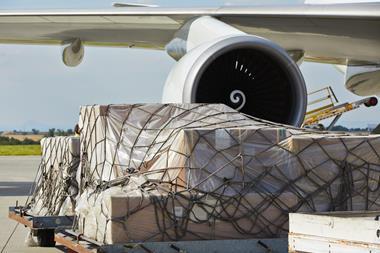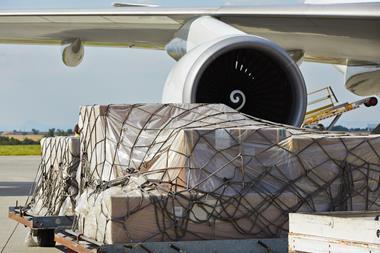
William Potter/Shutterstock.com
There are signs that some e-commerce volumes to the US are shifting from air cargo to seafreight and the potential introduction of stricter de minimis rules could speed up the rate of change.
This was the verdict of Freightos’ ‘Global Freight Outlook’ webinar last week, which looked at how action by the incoming Trump presidency may affect e-commerce airfreight, including de minimis exemptions that currently mean shipments worth less than $800 are excluded from customs tariffs and reporting and filing customs requirements.
During the recent webinar, Judah Levine, Freightos’ head of research, said that there are already signs that some Chinese exporters and US e-commerce importers or sellers are starting to build up inventories via ocean freight in anticipation of stricter rules.
And if there are sudden changes to rules there could be a dramatic impact on air cargo.
“If there is some closing of de minimis or closing into certain countries or certain types of goods, that could be dramatic,” he said.
He added: “One avenue is through Mexico. There are other signs that some are shipping directly to the US which would reduce the reliance on air.
“Steps like these may signal that an e-commerce shift away from air cargo is already underway.
“If there was some significant change to de minimis, if it was blocked or lowered to a very low level that could mean an even faster shift.”
Levine stressed e-commerce shipments are already facing several challenges in the US and in Europe.
In addition to potential US changes, the European Commission plans to remove the customs duty exemption for goods valued up to €150
However, Adam Lewis, president at Clearit customs brokers, noted that the industry is still awaiting potential changes to de minimis exemptions with the focus being more on high-value imports.
“I think the shift to ocean is going to be relatively slow. I don’t think there’s been a big rush to start using ocean air cargo to bring in those (e-commerce) products and type 86 shipments haven’t really had much reliance on container shipping in the past.”
Lewis said that while air cargo rates might drop, longer term, the market will adjust.
“Air cargo is a lot more dynamic and responsive to supply and demand so, if some rule changes go into effect that does make importing low-value products either more expensive or more cumbersome I think it might have a modest effect on ocean rates as we start to shift reliance on containers, maybe a little bit more so on air pricing as that availability increases with fewer type 86 shipments. But I think it should have a pretty minimal effect.”
But asked if there was concrete talk of the Trump administration seeking to close de minimis exemptions to Chinese goods, Lewis stated: “What the Trump administration is talking about goes way beyond just enforcement of de minimis rules. With some of the tariffs that they’re looking to put in place you could see a closure of this loophole altogether.”
Tough tariffs
On the plans for tariffs, Lewis stated that during a webinar held by the National Customs Brokers & Forwarders Association of America, trade professionals had said steep measures were certainly being considered.
According to Lewis, it emerged that: “Trump is looking to apply a 10-20% tariff on everything coming into the country regardless of where it’s from or what it is, a 60-100% tariff on any goods coming in from China, a 100% tariff on any country that has abandoned the US dollar and a 100% tariff on vehicles made in Mexico.”
He warned the above could be implemented without strict requirements if the International Economic Emergency Powers Act is used.
That said, Levine noted that: “Tariffs will probably not impact air cargo volumes and rates as much as ocean because of the possibly long lead time to prepare for these tariff rollouts.”
“Shippers are mostly going to bring in goods by ocean before the tariffs go into effect, though we may see some increase in air demand as a result, especially in the last few weeks or if it turns out there’s a very short window before tariffs go into effect.”
Some stakeholders in the industry are of the view that e-commerce has become a saturated market, while various government regulations may restrict it regardless.
According to analyst Xeneta, the market faces an overreliance on e-commerce.
Levine previously told Air Cargo News that the new Trump government will likely act to close a de minimis exemption for imports into the US, impacting the cost and speed of shipments and threatening the viability of sending e-commerce goods by air.


















